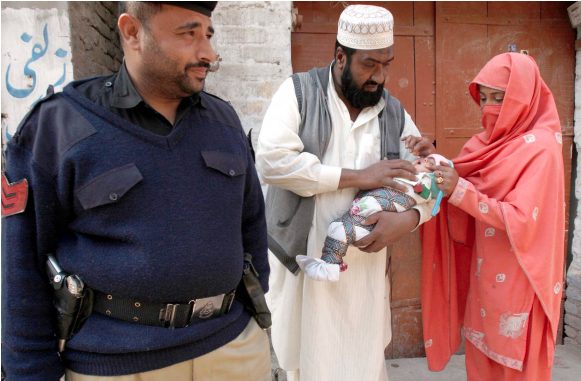From Ebola and Zika to city violence and party drugs – police, security forces and health must pull together

Experts have put global decision makers on notice that the world cannot afford the human and financial cost of continued disengagement between police, armed forces and the health sector.
In a special Security and Health series in The Lancet published online today, they say security and police forces should be recognised as key players, rather than intruders, in public health, and have called for this to be backed by investment in partnerships and reform.
Series coordinator and co-author Nicholas Thomson, Co-Director of the Security and Health Executive Leadership Institute at the University of Melbourne School of Population and Global Health, and a Research Fellow at the Center for Public Health and Human Rights in Johns Hopkins’ Bloomberg School of Public Health – joined by colleagues at some of the world’s leading public health research institutions and police strategy think tanks – said this approach would save millions of lives.
“In too many places, security forces and the health sector are on a collision course, with fatal consequences for the populations caught in the middle,” Dr Thomson said.
“Yet there are success stories, too – we’re just not joining the dots.”
Particularly relevant this Australian summer is the interaction between police and people who may be using alcohol and drugs.
With police backing, Sydney’s supervised drug injecting centre has since 2001 prevented countless deaths, while in cities like Amsterdam and Barcelona, pill testing has become mainstream and supported by local government and has likely saved the lives of many young people. There is growing pressure on State governments to legalise drug checking to avoid more overdose deaths.
Dr Thomson said the 2014 Ebola outbreak in West Africa and Brazil’s 2015 Zika outbreak were examples of how military resources, expertise and rapid response capability had been mobilised to help rein in disease outbreaks that are significant threats.
The new recent outbreak of Ebola in the Democratic Republic of Congo (DRC) he said, had further highlighted the importance of health security cooperation, with the DRC Government’s soldiers and local police being deployed alongside UN Peacekeeping forces to protect health workers engaged at treatment and vaccination sites from attack by rebel militias.
“Security forces come with vast resources, power, expertise and the ability to act quickly. All this should be employed to improve health, not undermine it. We need the security and health sectors to talk to each other, train together and work together in a systematic way,” Dr Thomson concluded.
The call for closer, systematic cooperation is likely to be controversial, given security forces in many regions are responsible for targeting civilians and health infrastructure, violating human rights, and harassing marginalised groups such as refugees.
"Cooperation is not always going to be possible or desirable, but we can do a lot better,” said Joshua Michaud, Associate Director with the Global Health Policy team at the US-based Kaiser Family Foundation.
“An ambitious, pragmatic program to foster cooperation could result in security forces working more in tandem with global and public health efforts and less at cross-purposes.”
Chatham House contributing author Louis Lillywhite, a former surgeon-general of the UK armed forces, said security forces needed to accept their responsibility to safeguard the health of entire populations.
“What the military do in border regions and conflict zones is absolutely critical: with 68 million refugees at large in the world and attacks on healthcare facilities increasing, the risk of epidemics is significant, and we’re seeing diseases like polio and cholera make a comeback,” Lt Gen Lillywhite said.
“In these places, health workers and military personnel are often thrown together yet flying blind because there is no global framework or investment to facilitate their engagement. We need to consider when and how militaries can contribute and plan accordingly.”
Contributing author David Heymann, a London School of Tropical Hygiene Professor of Infectious Disease Epidemiology, said engagement within a health and human rights framework often meant the difference between success or failure in epidemic control.
“Take HIV – wherever key groups like injecting drug users and sex workers are harassed and criminalised, it is more difficult to access those who are at risk of infection,” Professor Heymann said.
“But when you have health workers, communities and police and militaries engaging on an equal footing, in partnership, elimination becomes achievable. The partnerships formed in the response to HIV over the decades are a model for many other public health challenges.”
Contributing author and Australian Institute of Police Management Director (Knowledge) Victoria Herrington said partnerships were critical in many areas of policing, especially when interacting with people who may have compromised mental health or at risk of harm from alcohol and drugs.
In policing, tackling crime as a public health problem with an innovative policing and health authority partnership has seen Glasgow – once Western Europe’s murder capital – become one of the safest cities in Europe.
“In mental health, deinstitutionalisation and the loosening of community ties and supports are resulting in vulnerable people being more likely to increasingly come into contact with police and hospitals,” Dr Herrington said.
“There’s a lot of overlap in public health and crime, but at present this doesn’t always translate into how we respond to urgent societal problems, such as family and gender violence, modern slavery and human trafficking.
"Police management is acutely aware of the need to respond to the drivers of crime which in many cases may be unaddressed health and social needs of the offender – improving partnerships and co-designing interventions with the health and social sectors is critical.”